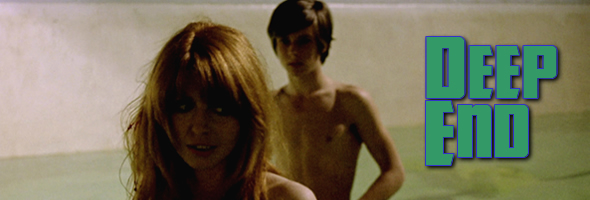
Color, 1970, 90m.
Directed by Jerzy Skolimowski
Starring Jane Asher, John Moulder-Brown, Karl Michael Vogler, Christopher Sanford, Diana Dors
BFI (Blu-Ray & DVD) (UK R0 HD/PAL)/ WS (1.85:1) (16:9)

Color, 1970, 90m.
Directed by Jerzy Skolimowski
Starring Jane Asher, John Moulder-Brown, Karl Michael Vogler, Christopher Sanford, Diana Dors
BFI (Blu-Ray & DVD) (UK R0 HD/PAL)/ WS (1.85:1) (16:9)
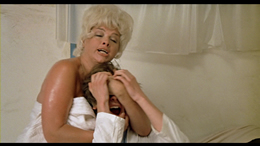 A regular staple of "major films not on DVD" lists since the format's inception, the ominous Swinging London classic Deep End belongs to that sadly enormous stable of Paramount imports completely neglected by the studio throughout the late '60s and early '70s, such as the excellent Unman, Wittering & Zigo and The Penthouse. Though it wasn't a big box office hit, the film obviously made an indelible impression on a lot of impressionable viewers; it's frequently spoken of in reverent tones as one of the greatest "lost" films and a key entry in the transition from counterculture cinema to the more paranoid, pessimistic indie films of the '70s. Seen today, it's still easy to see what all the fuss is about.
A regular staple of "major films not on DVD" lists since the format's inception, the ominous Swinging London classic Deep End belongs to that sadly enormous stable of Paramount imports completely neglected by the studio throughout the late '60s and early '70s, such as the excellent Unman, Wittering & Zigo and The Penthouse. Though it wasn't a big box office hit, the film obviously made an indelible impression on a lot of impressionable viewers; it's frequently spoken of in reverent tones as one of the greatest "lost" films and a key entry in the transition from counterculture cinema to the more paranoid, pessimistic indie films of the '70s. Seen today, it's still easy to see what all the fuss is about.
Still in the latter stages of puberty, young Mike (Vamprie Circus's Moulder-Brown) gets a job at a local public bath house in London where one of the pretty pool attendants, Susan (Masque of the Red Death's Asher), informs him he'll get a lot of good tips from the randy, desperate clientele of both genders. She turns out to be correct, as he's immediately pawed by a middle-aged patron (Dors, doing a queasy parody of her sex kitten days). Susan is engaged to a jerk named Chris (Die Screaming Marianne's Sanford), but that doesn't stop the sexually inexperienced Mike from 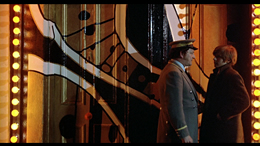 developing a fixation that starts off as puppy love but turns into something considerably darker.
developing a fixation that starts off as puppy love but turns into something considerably darker.
Polish director Jerzy Skolimowski was an unknown quantity to many English-speaking viewers at the time, having earned acclaim for his '67 film The Departure but little love for what he personally views as his worst film, the 1970 comedy epic The Adventures of Gerard. His outsider view of London is an obvious cousin to Roman Polanski's morally decayed and queasy depiction of it in Repulsion, but here we have vivid color and a few years of social upheaval in the interim to broaden the theme of sexual malaise and depravity to an entire city rather than an issue within a single character. Mike certainly isn't the most stable of protagonists, but everyone has serious issues of one kind or another; as Susan, the beautiful Asher (who was famous for dating Paul McCartney until 1968 and appearing as one of the women in Alfie) has one of her best roles, adopting a lower class accent and offering some of the era's most memorable nudity (including a lengthy apperance as a topless cardboard cutout that winds up at the bottom of a swimming pool). Meanwhile Moulder-Brown offers the right balance of childish confusion and potential psychosis, a perfect continuation of his previous unforgettable role in The House that Screamed. Also significant is the sparing but powerful use of music, with the crashing chords of Cat Stevens/ powerhouse "But I Might Die Tonight" (later rerecorded with less ferocity for his album Tea for the Tillerman) opening and closing the film along with a memorable appearance by Can's "Mother Sky."
A terrific and deeply haunting film 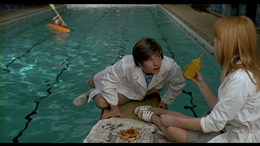 that would be far better known if its studio had bothered to ever release it on home video, Deep End has always stirred up excitement whenever it's popped up on late night TV screenings (including a pair of airings on Turner Classic Movies). Unfortunately it's always been presented in horrendous quality from a very dated old tape master with plentiful damage and very soft detail, and most people who couldn't catch a TV airing had to suffer with even worse bootleg copies. The BFI's announcement of a restoration for the film came as a pleasant surprise, and it even got some theatrical play in the UK with Moulder-Brown and Asher reuniting for the first time since the production for a screening Q&A. The restoration obviously doesn't have much competition from any past versions, but it is indeed quite a stunner. The film is released from the BFI as a dual-format edition containing a Blu-Ray and a DVD, but the former is definitely the way to go if you have the capability. Colorful, detailed, and very filmic, it's only limited at times by the film stock that tends to go a bit grimy and nasty during some of the night scenes like many of its early '70s ilk. It's really hard to imagine how this could possibly look any better, and for anyone pining for a good version of this film to be released someday, it easily exceeds expectations. The mono audio is also very sharp and much more intelligible than even the rough theatrical prints that survived over the years.
that would be far better known if its studio had bothered to ever release it on home video, Deep End has always stirred up excitement whenever it's popped up on late night TV screenings (including a pair of airings on Turner Classic Movies). Unfortunately it's always been presented in horrendous quality from a very dated old tape master with plentiful damage and very soft detail, and most people who couldn't catch a TV airing had to suffer with even worse bootleg copies. The BFI's announcement of a restoration for the film came as a pleasant surprise, and it even got some theatrical play in the UK with Moulder-Brown and Asher reuniting for the first time since the production for a screening Q&A. The restoration obviously doesn't have much competition from any past versions, but it is indeed quite a stunner. The film is released from the BFI as a dual-format edition containing a Blu-Ray and a DVD, but the former is definitely the way to go if you have the capability. Colorful, detailed, and very filmic, it's only limited at times by the film stock that tends to go a bit grimy and nasty during some of the night scenes like many of its early '70s ilk. It's really hard to imagine how this could possibly look any better, and for anyone pining for a good version of this film to be released someday, it easily exceeds expectations. The mono audio is also very sharp and much more intelligible than even the rough theatrical prints that survived over the years.
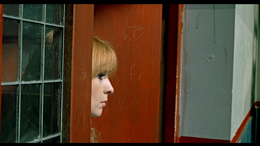 The biggest extra here is easily the 74-minute "Starting Out," a new making-of documentary which takes its name from the film's original shooting title. Both of the stars are present and recall a lot about the film, which they still respect tremendously. They discuss their director's limited grasp of English, Moulder-Brown's impression that he was supposed to be ad libbing his role, and a filmed but (wisely) discarded extended ending that solidified the fate of one major character. Also present are Skolimowski (who later went on to direct the better known The Shout and Moonlighting), Sanford, cinematographer Charly Steinberger, art director Anthony Pratt, and editor Barrie Vince, with topics ranging from the Polanski precedent to the film's odd release history. Other extras include a lengthy full frame theatrical trailer, an additional 12-minute featurette describing scenes that were dropped from the final cut (including a steamroom scene whose script is shown and whose loss everyone seems to regret), and a pretty creepy little 10-minute short film from 1977, "Careless Love," which features Asher (who's apparently going to be gorgeous for several more decades) as a single mom who finds a macabre solution to her boyfriend's commitment reservations. The enclosed booklet features liner notes by writer David Thompson about the film, an essay on "Permissive British cinema?" by Yvonne Tasker, brief notes on the Can song by William Fowler, a Skolmowski bio by Ewa Mazierska, and additional notes on "Carless Love" by its director, Francine Winham. Though not available for review at this time, a limited three-disc set is also available containing the full Q&A by Moulder-Brown and Asher at the screening if you're a die-hard fan; no matter which choice you make, this one's been a long time coming for cult movie fans and was certainly worth the wait.
The biggest extra here is easily the 74-minute "Starting Out," a new making-of documentary which takes its name from the film's original shooting title. Both of the stars are present and recall a lot about the film, which they still respect tremendously. They discuss their director's limited grasp of English, Moulder-Brown's impression that he was supposed to be ad libbing his role, and a filmed but (wisely) discarded extended ending that solidified the fate of one major character. Also present are Skolimowski (who later went on to direct the better known The Shout and Moonlighting), Sanford, cinematographer Charly Steinberger, art director Anthony Pratt, and editor Barrie Vince, with topics ranging from the Polanski precedent to the film's odd release history. Other extras include a lengthy full frame theatrical trailer, an additional 12-minute featurette describing scenes that were dropped from the final cut (including a steamroom scene whose script is shown and whose loss everyone seems to regret), and a pretty creepy little 10-minute short film from 1977, "Careless Love," which features Asher (who's apparently going to be gorgeous for several more decades) as a single mom who finds a macabre solution to her boyfriend's commitment reservations. The enclosed booklet features liner notes by writer David Thompson about the film, an essay on "Permissive British cinema?" by Yvonne Tasker, brief notes on the Can song by William Fowler, a Skolmowski bio by Ewa Mazierska, and additional notes on "Carless Love" by its director, Francine Winham. Though not available for review at this time, a limited three-disc set is also available containing the full Q&A by Moulder-Brown and Asher at the screening if you're a die-hard fan; no matter which choice you make, this one's been a long time coming for cult movie fans and was certainly worth the wait.
![]()